|
|
|
Sort Order |
|
|
|
Items / Page
|
|
|
|
|
|
|
| Srl | Item |
| 1 |
ID:
148361
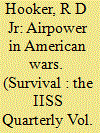

|
|
|
|
|
| Summary/Abstract |
Modern warfare has shown us that actors who lack airpower can contend successfully with the American military.
|
|
|
|
|
|
|
|
|
|
|
|
|
|
|
|
| 2 |
ID:
147100


|
|
|
|
|
| Summary/Abstract |
The United States has the best military in the world today, by far. U.S. forces have few, if any, weaknesses, and in many areas—from naval warfare to precision-strike capabilities, to airpower, to intelligence and reconnaissance, to special operations—they play in a totally different league from the militaries of other countries. Nor is this situation likely to change anytime soon, as U.S. defense spending [2] is almost three times as large as that of the United States’ closest competitor, China [3], and accounts for about one-third of all global military expenditures—with another third coming from U.S. allies and partners.
|
|
|
|
|
|
|
|
|
|
|
|
|
|
|
|
| 3 |
ID:
085240


|
|
|
|
|
| Publication |
2008.
|
| Summary/Abstract |
The article describes the cooperation between the Second Department Polish Army (intelligence) and American military attach s.
There have not been any separate monographs regarding the cooperation between the Second Department of the General Staff of the Polish Armed Forces and other secret services in the 1930s yet. Although this subject is quite essential, it is treated as a part of a more extensive issue, namely the operational activity of the Polish military secret service in the years 1918-1939.
The documents included in this article are the part of the correspondence between the American Attach s and the Second Department and deal mainly with organization, weaponry and dislocation of the units of the Red Army. Many of these documents contained the requests to the subsequent chiefs of the II Department of the GS of the PAF made by American diplomats. They asked to provide them with information about the Ordre de Bataille (the Battle Plan) of the Red Army and new types of weaponry and equipment of the Soviet armed forces.
|
|
|
|
|
|
|
|
|
|
|
|
|
|
|
|
| 4 |
ID:
175673


|
|
|
|
|
| Summary/Abstract |
Following the Persian Gulf War, many asserted that the American military exorcized the demons of the Vietnam War. It was inappropriate to make this claim since the war was reminiscent of the conventional conflicts the United States was involved in earlier in the twentieth century. While examining America’s unconventional conflicts since the failure in Vietnam, one recognizes Washington is still having trouble dealing with them. It is especially difficult for the world’s lone superpower to establish stability in the nations where fighting is taking place. Certain officials in the U.S. government believe residual forces can produce order over the course of time. Within this article, though, it will be demonstrated that residual forces seldom generate such an outcome.
|
|
|
|
|
|
|
|
|
|
|
|
|
|
|
|
| 5 |
ID:
073257


|
|
|
|
|
| Publication |
London, Penguin, 2006.
|
| Description |
xiv, 482p.pbk
|
| Standard Number |
0713999586
|
|
|
|
|
|
|
|
|
|
|
|
Copies: C:1/I:0,R:0,Q:0
Circulation
| Accession# | Call# | Current Location | Status | Policy | Location |
| 051870 | 956.70443/RIC 051870 | Main | On Shelf | General | |
|
|
|
|
| 6 |
ID:
084536


|
|
|
| 7 |
ID:
091795
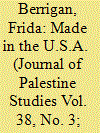

|
|
|
|
|
| Publication |
2009.
|
| Summary/Abstract |
Enforcement of U.S. law concerning weapons exports and the disbursement of military aid are subject to highly politicized interpretations of concepts like "legitimate self-defense" and "safeguarding internal security." As illustrated by Israel's July 2006 war in Lebanon and its 2008-2009 Operation Cast Lead in Gaza, Washington has essentially allowed Israel to define "self-defense" however it chooses. This overview of U.S. military aid to Israel, including weapons sales and related support of its domestic military industrial complex, examines in detail the mechanisms through which aid is funneled, the restrictions on aid that do exist, and the uses to which U.S. military aid has been put-particularly in terms of Israel's military operations and its exports abroad.
|
|
|
|
|
|
|
|
|
|
|
|
|
|
|
|
| 8 |
ID:
120884


|
|
|
|
|
| Publication |
2013.
|
| Summary/Abstract |
This article offers an examination of the gendering of the Philippines' Muslim South under American military rule (1899-1913) through discourses of violence against women. It explores the exposition and discussion of cases involving abuse, murder, enslavement, and violence in both official and unofficial reports, which revealed a critical discourse of gender construction for both coloniser and colonised in Moro Province.
|
|
|
|
|
|
|
|
|
|
|
|
|
|
|
|
| 9 |
ID:
165024


|
|
|
|
|
| Summary/Abstract |
There are 22 million veterans in the U.S. Armed Forces. Past research on the musculoskeletal health of military veterans has explored the prevalence of musculoskeletal disorders (MSDs) but largely avoids situating findings within a theoretical framework. This article uses Pierre Bourdieu’s theory of cultural capital to contextualize veteran’s greater rates of MSDs compared to nonmilitary civilians. Cultural capital consists of objectified, institutional, and embodied capital that can be transubstantiated to capital in other areas. Embodied or physical capital is central to military service, and military veteran status is beneficial in accessing social and institutional capital. Using the 2012–2014 National Health Interview Survey, we show veterans are more likely to report activity-limiting MSDs, and at younger ages, compared to nonveterans. Physical capital is central to, and impaired by, status as a veteran.
|
|
|
|
|
|
|
|
|
|
|
|
|
|
|
|
| 10 |
ID:
107340


|
|
|
| 11 |
ID:
165022
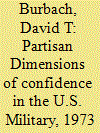

|
|
|
|
|
| Summary/Abstract |
Americans express more confidence in their military than any other institution. The components and causes of confidence have been little studied, especially as a partisan phenomenon. This study assesses trends in how partisanship and ideology affect confidence in the military. Multivariate analysis of General Social Survey and Harris Poll data shows that while confidence has increased for all demographic and political subgroups, partisanship and ideology play larger roles than commonly recognized. Democrats and Republicans are more confident than independents, but Republican confidence increased sharply over the last 20 years. Party ID is now the best predictor of one's confidence in the military. Conservative ideology has little effect, but liberalism reduces confidence, splitting Democrats. The pattern is not only “Republicanization,” however; partisans on both sides are more confident when their party holds the White House.
|
|
|
|
|
|
|
|
|
|
|
|
|
|
|
|
| 12 |
ID:
125996


|
|
|
|
|
| Publication |
2013.
|
| Summary/Abstract |
Counterinsurgency as an operational method employed by the American military to achieve policy aims at a reasonable cost in blood and treasure has failed miserably. The idea that it has worked should be buried in the ground with a requiem stating that counterinsurgency is dead. Unfortunately, a large group of writers over many years have constructed a deeply flawed narrative that suggests that it is alive and well and continues to shape and influence American foreign policy toward and activist use of American military force in the world's troubled spots.
|
|
|
|
|
|
|
|
|
|
|
|
|
|
|
|
| 13 |
ID:
123349
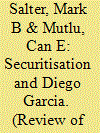

|
|
|
|
|
| Publication |
2013.
|
| Summary/Abstract |
To advance the on-going debate on Securitisation Theory (ST), we argue that the important questions of audience and attention can be addressed through careful historical study. In an analysis of the securitising moves concerning the American military base on Diego Garcia, we are able to demonstrate that the Copenhagen and Paris Schools are not methodologically incompatible, and empirically that public attention for security issues has a tendency to dissipate without continual discursive investment.
|
|
|
|
|
|
|
|
|
|
|
|
|
|
|
|
| 14 |
ID:
151757
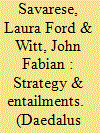

|
|
|
|
|
| Summary/Abstract |
This essay aims to redescribe key moments in the history of American military engagements to account for a persistent role that law has played in these conflicts. The law of war tradition has persisted since the War of Independence, we argue, because of an internal dynamic that makes it both strategically useful and costly for the United States to commit itself to rule-bound warfare. Invoking the laws of war to advance the strategic interests of the United States, American soldiers and statesmen have found, entails consequences beyond their control, making reversals in position more costly and enabling critiques in the language of the law. These entailments, we argue, are built into the enduring strategic value of the laws of war. The law has remained useful not because it can claim perfect neutrality, but because it has force independent of the interests for which it is mobilized.
|
|
|
|
|
|
|
|
|
|
|
|
|
|
|
|
| 15 |
ID:
138732
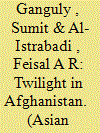

|
|
|
|
|
| Summary/Abstract |
AFTER CONSIDERABLE EXPENDITURE OF BOTH BLOOD AND TREASURE, the United States has now effectively withdrawn from Afghanistan. As of January 2015, over 2,200 U.S. servicemen and women have died in combat in that country, with more than 17,200 Afghan civilians dead. Further, according to a Pentagon estimate, the war has cost the U.S. $300 million a day. Support for the war in the U.S. has begun to wane in Congress, and the Obama administration does not seem overly concerned about declining congressional support. U.S. allies, who have steadily reduced their presence in the country, also show signs of growing fatigue with their involvement as domestic support for the presence of their troops in Afghanistan has dramatically tapered off.
|
|
|
|
|
|
|
|
|
|
|
|
|
|
|
|
| 16 |
ID:
163356
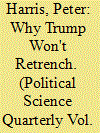

|
|
|
|
|
| Summary/Abstract |
AT THE TIME OF HIS INAUGURATION, it appeared plausible that President Donald J. Trump would deliver the most dramatic shifts in U.S. foreign relations at least since the September 11 terror attacks, probably since the end of the Cold War, and perhaps even—in some important respects—since World War II. As a candidate for office, after all, Trump had made no secret of his disdain for the organizing principles of U.S. foreign policy. He took particular aim at the great edifice of U.S. internationalism, styling himself as an unapologetic nationalist whose “America First” approach to foreign affairs compared favorably with the perfidious “globalism” of his political opponents.
|
|
|
|
|
|
|
|
|
|
|
|
|
|
|
|
|
|
|
|
|